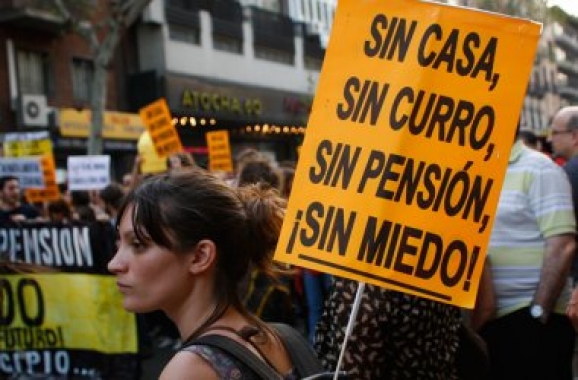Young people in the future society
Crisis and Social Contract
Madrid, 16 April 2014 | Social, Economy
A summary of the Reina Sofía Center on Adolescence and Youth study
Compiled by Eduard Cabré Romans*
How has the crisis affected the social contract in the EU? How has one of the most important added values of Europe been compromised by the financial and social instability of the last years? These are only some of the questions the study run by the Reina Sofía Center on Adolescence and Youth attempts to address.
The report focuses on the challenges and the perceptions of Spanish youth in relation to the crisis. It analyses the social and economic factors that influence their wellbeing the most, while emphasising their fears and opinions on the future. It describes the needs and expectations of young people in Spain and compares them to the socio-economic context they live in.
Read MoreWithin the framework of the social contract that was promoted in Europe in the second half of the 20th century (since the 80s in the case of Spain), housing was considered one of the key elements to assure good social conditions for everyone. Although social contracts were quite different among European countries, they all shared the will to institutionalise the spheres in which private and public initiative were supposed to take priority over each other, the promotion of social values such as an entrepreneurial spirit, the possibility of social mobility between different income groups or the existence of a close relationship between production and consumption. In return for asking young people to study and work hard, society was committed to materialize welfare through public policies intended to provide them with education, employment and housing.
Job insecurity and the lack of job stability increased in Spain after the 1993-1994 crisis for the first time since democracy was restored. At the same time, the expansion of the housing market until 2007 had a very negative effect in terms of accessibility, especially for the youth. With the burst of the economic and financial crisis in 2008, a generalized drop in wages and high unemployment rates among the youth broke the social contract.
Spanish youngsters consider having access to a job as a right that the state should provide them with as a part of the welfare state. This perspective is in accordance with the European social model, but contrasts with the liberal model prevailing in the United States. The limitations of the Spanish welfare state are counterbalanced by the role of the family, which works as a welfare network for those who can’t find a job and/or can’t emancipate.
Regarding housing
12,8% of interviewees say that renting a house is one of their main current difficulties, while 11,8% say it referring to difficulties to buy a house. In terms of the most important measures to improve the situation of youngsters, 22,5% would improve subsidies to promote emancipation, 13,4% are in favour of increasing aid to home purchase and 11,6% would increase aid for renting. 59,2% consider that they will have great difficulties to afford buying or renting a dwelling in the following 3 years.
All in all, a majority of interviewees recognise that work is linked to social integration and personal dignity, being housing one of the most important means to achieve these two goals. However, with no intention of underestimating the importance of housing, having a job is considered the main mean to achieve decent life conditions.
* Researcher at the European Social Housing Observatory of CECODHAS Housing Europe
Leave comments